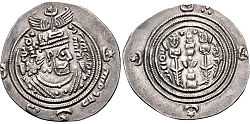Ziyad ibn Abi Sufyan

Ziyad ibn Abih (Arabic: زياد بن أبيه) (d. 673 AD) was a Muslim general and administrator and a member of the clan of the Umayyads.
Biography
Ziyad ibn Abi Sufyan was adopted by Abu Sufyan and was born in Ta'if (in what is now Saudi Arabia) to a member of the Banu Fuqaim, of unknown parentage, due to the promiscuity of his mother.
at the wake of Caliph Uthman's Murder, Ibn Hadrami, an Umayyad strong political Figure demanded the vengeance of the murder of Utham and started uprising as the response Caliph Ali sent Jariah Bin Qudamah from Tamim tribe to suppress the rebellion has been killed by some so-called 'pro-Ali Faction' or more known as 'Shia-Ali' during the confusion. when people of eastern Persia and Kerman heard this they protesting and refuse to pay Kharaj(land tax). so in response, In 659 CE Caliph Ali consulting with Abdullah Bin Abbas and the former agreed sent Ziyad ibn Abi Sufyan to suppress a Persian rebellion in Estakhr. Ziyad succeeded at this and stayed on as governor.[1] In 661 Ali was assassinated and Mu`awiyah succeeded as Caliph. In 662, he sent Mughira, his governor at Kufa, to Istakhr to recall Ziyad to Damascus and Ziyad obeyed. The Umayyad Mu`awiyah Sufyan, governor at Damascus, opposed Ali's rule and repeatedly tried to lure his kinsman Ziyad to his camp.
In 664, Muawiyah and Ziyad reached an agreement: the Caliph recognised Ziyad as a brother - Ziyad now adopted the name ibn Abi Sufyan - and appointed him governor at Basra, replacing the Umayyad `Abd Allah, who had proved a great general but a poor administrator. This act was then and later considered a scandal in Islam, criticised in contemporary satire and by the 13th century historian Ibn al-Athir:[2]
Suyuti wrote that Muawiya decision to declare Ziyad as his brother, and thus allowing Ziyad to receive inheritance from Abu Sufyan, to be against the Sharia[3]
Ziyad's first act in Basra was to deliver a khutba from the pulpit. This speech promised that Umayyad jurisprudence would be swift and talionic: "We have brought a punishment to fit every crime. Whoever drowns another will himself be drowned; whoever burns another will be burned; whoever breaks into a house, I will break into his heart; and whoever breaks into a grave, I will bury him alive in it." And Ziyad warned: "I demand obedience from you, and you can demand uprightness from me... Do not be carried away by your hatred and anger against me, it would go ill with you. I see many heads rolling; let each man see that his own head stays upon his shoulders!" (Morony pp. 78–81)
In 670, Mughira governor of Kufa died of plague, and caliph Mu'awiya handed the administration of that city to Ziyad as well. Ziyad altered the city's plan from seven districts to quarters. Hujr ibn Adi soon agitated against Ziyad, and Ziyad clapped him in irons and shipped him to Damascus.
Ziyad also planned great mosques where he ruled, as a symbol of his supremacy and that of his religion. (Cresswell pp. 12–13)
In 671, Ziyad sent 50,000 Arab troops to the Iranian oasis of Merv as a colony. This colony retained its native Kufan sympathies and became the nucleus of Khurasan. (Muir pp. 295–6)[4]
Ziyad died in 673, and Mu`awiyah appointed his son Ubayd-Allah ibn Ziyad as successor.
See also
- Sahaba
References
- ↑ e032 By IslamKotob
- ↑ Tareekh of Ibn Atheer Volume3 p. 24, under the Chapter addressing the events of 44 Hijri:
- ↑ Tarikh al-Khulafa, p. 175
- ↑ Islamic History: Volume 1, AD 600-750 (AH 132): A New Interpretation By M. A. Shaban
External links
Bibliography
- Cresswell, K. A. C. "A Short Account of Muslim Architecture". Beirut, Librairie du Liban. 1958.
- Morony, Michael G. "Tabari's History" vol. XVIII. 1987.